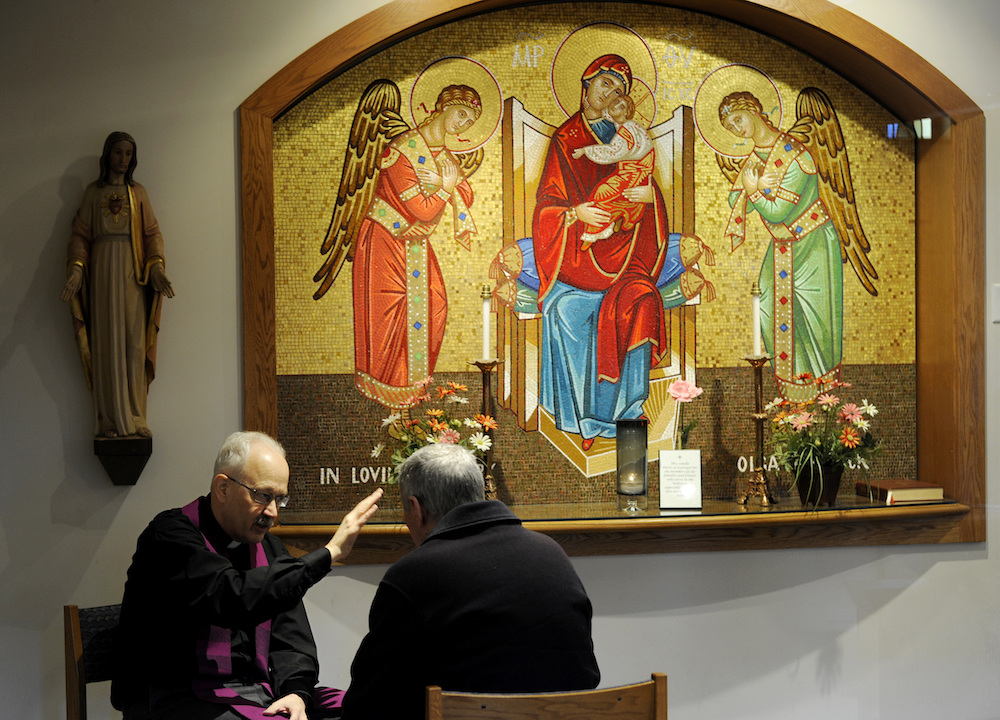Lent is the season of return.
This is the theme we hear in the weekday liturgies of Lent, especially in the Old Testament readings.
Day after day, we hear accounts of the people coming back to the Lord, opening their hearts to confess their sins and failures, and asking his forgiveness.
The people’s honesty about themselves and their weaknesses is astonishing. So is their confidence that God will treat them with mercy and welcome them back.
As I write, we are early in the second week of Lent. On Monday, we heard the prophet Daniel’s confession: “We have sinned, been wicked and done evil; we have rebelled and departed from your commandments and your laws.”
And on Tuesday, the prophet Isaiah gives us this beautiful promise from God: “Come now, let us set things right, says the Lord. Though your sins be like scarlet, they may become white as snow.”
This is the promise that is available to each one of us in the Sacrament of Penance and Reconciliation.
This sacrament was the first gift that Jesus gave to the world after rising from the dead. On that first Easter night, he breathed his Holy Spirit into his apostles, his first priests, and granted them the awesome power to forgive sins in his name.
“Whose sins you forgive are forgiven them,” he told his priests.
Our Lord knew that, in order to follow him, we would need these “traveling mercies,” all the beautiful mercies and graces that flow to us in this sacrament, enabling us to keep on our journey with him.
Even the saints are sinners. The Scriptures tell us that the righteous fall seven times daily. That is why we need confession. We need to have some way to tell God that we are sorry, to hear his words of forgiveness, and to pick ourselves up.
The most beautiful scenes in the Gospel are scenes of confession and forgiveness, as Jesus shows the merciful face of God to those who come seeking healing and liberation.
We all remember the story of the prodigal son who confesses his sins and is welcomed home to the loving arms of his father.
God’s mercy matters; we all need it. That is why his door is always open to us, he is always waiting for our return. Just as in the story of the prodigal son.
God forgives the contrite heart, even though we continue to sin or make the same mistakes. What is important is our resolve, our desire to get stronger, to grow in holiness.
In my last column, I urged you to get in the habit of making a daily examination of conscience. Here I want to appeal to you to make a habit of regular confession — once a month, even once every couple of weeks.
Do not make it complicated, or get hung up on the “form.” The priest will be there to help you.
Tell the priest, “Lord, you know all things, you know that I love you.” Then confess your sins. The saints speak of the “four C’s” — make your confession clear, concise, contrite, and complete.
Speak honestly, tell all your sins; you do not need to go into detail or give explanations. And most important, have true sorrow in your heart and the intention not to commit these sins again.
Remember, you are talking not to a man, you are confessing your sins to God. The priest has been ordained to stand in the place of Jesus himself. Listen closely to what he tells you after you confess your sins; he will have words of advice, encouragement, and he will assign a simple penance.
Then make a good act of contrition. Speak personally, from the heart: “Lord Jesus, Son of God, have mercy on me, a sinner.”
After that, listen as the priest prays, with the power and authority given to the apostles by Jesus: “I absolve you from your sins in the name of the Father, and of the Son, and of the Holy Spirit.”
These are some of the most beautiful words we can ever hear.
We have gathered some excellent resources on our website, to help you examine your conscience and make a good confession.
Just know that the more often you go to confession, the easier it gets. The better you are able to examine your conscience and to make a complete confession, the more satisfying the experience is.
Pray for me and I will pray for you. And let us ask our Holy Mary, Mother of Mercy, to help us to go with confidence always to seek “the tender mercy of our God,” that her Son came to show us.

